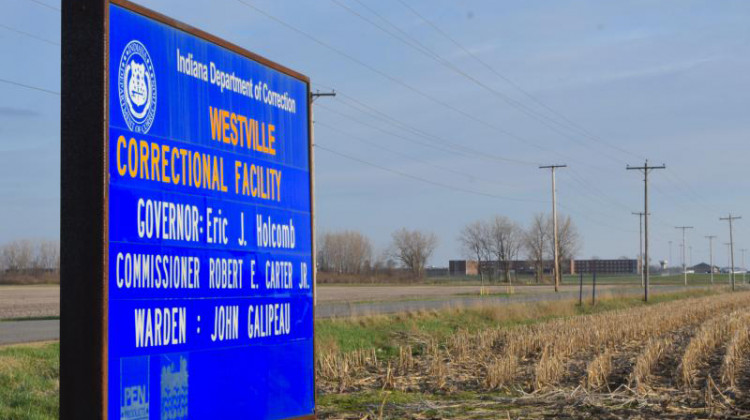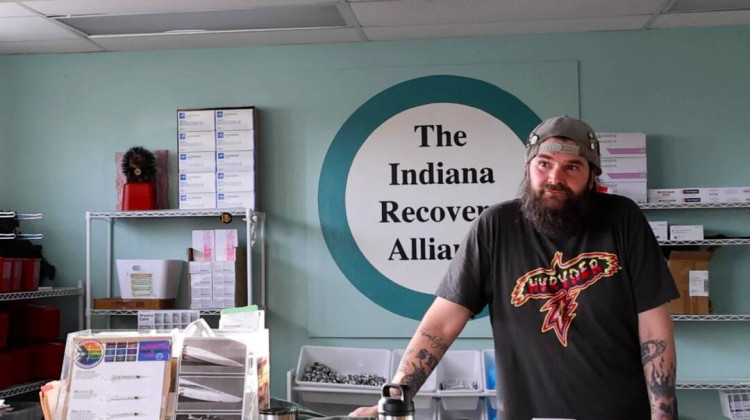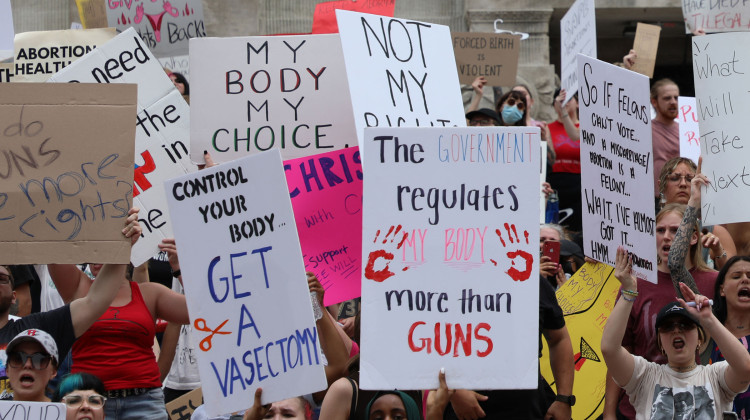During Monday’s coronavirus news conference, Gov. Eric Holcomb was optimistic about the situation statewide. He emphasized Indiana’s COVID-19 data.
“I believe that Indiana is, quite frankly, faring better than some other locales around the world,” he said. “We’ll continue to be very transparent about those numbers.”
Seated several feet away, the state health commissioner, Dr. Kristina Box, gave the day’s tally. More than 8,000 people had tested positive for COVID-19, she said, and more than 44,000 had been tested.
But the state is less transparent about information related to prisons — including the number of COVID-19 tests administered. It has mainly reported positive cases.
Side Effects has repeatedly asked state officials how many prisoners have been tested for COVID-19, and has not received an answer. The state refused a request for an interview, and declined to say how many prisoners have been isolated for possible exposure to the virus, how many have shown symptoms or how many prisoners are in serious condition.
Over the last week, Side Effects has heard from dozens of people concerned about their family members in prison. We’ve read messages from inmates and heard recorded phone calls with their loved ones. They say that many prisoners have been put into isolation, and others who exhibit COVID-19 symptoms are not being tested. Their accounts continue to undercut statements about the steps prisons take to curb the spread of the virus in prisons.
“If they’re doing things right they have no reason not to be transparent,” says Martin Horn, the former head of the New York City Department of Correction and the Pennsylvania Department of Corrections. “The public is always willing to believe the worst about prisons, and it’s always in the interest of good prison administration to be as transparent as possible.”
Corrections officials across the United States struggle to contain the virus. The New York Times has identified numerous clusters of COVID-19 cases in prisons, including in Michigan and Illinois, highlighting the dangers of institutions where hundreds or thousands of people are kept together.
At the end of Monday’s news conference, the discussion turned to prisons. "We have not had some of the outbreaks yet — and I hope we don't — as some other states have," Holcomb said. On that day, there were just 27, out of nearly 27,000 prisoners.
“We have acted very quickly. So to date, I think we’ve done an admirable job,” he said. “We have got our offenders in a safe place — we believe maybe even safer than just letting them out.”
Lisa, whose husband Dennis is in Plainfield Correctional Facility for theft, driving on a suspended license and resisting arrest, laughed when she heard the quote from the governor.
“Wow. That’s a big lie,” she said. “They have them herded like cattle, all crammed together, where the virus can just jump from one to the other. There’s no protection.”
At noon Thursday, the number of prisoners who tested positive jumped from 34 to 116.
‘I’m not doing good at all’
On Monday night, Dennis called Lisa from bed. (They asked that we omit their last names due to their concern that he would be punished for speaking out. Side Effects omitted other names in this story for the same reason.)
“I’m doing bad. I’m not doing good at all,” he told her, according to a recording she made of the call.
Last week, Dennis was certain he would contract coronavirus after some men in his dorm, including one who slept next to him, were removed with fevers. Now, he had a headache and his chest hurt. “My head is splitting,” he told Lisa. One of the other prisoners gave him three ibuprofen.
Dennis said they hadn’t been given any updates for several days, when they were told three prisoners at Plainfield had tested positive. But he estimated that 15 prisoners had been removed from his dorm, which normally houses more than 80 people. He guessed about half of the remaining prisoners showed some sort of symptoms. “Most of the guys in here are saying, “Well, we all got it. Just some of us have symptoms, some of us don’t,’” he said.
The state has confirmed 11 cases at Plainfield so far.
Prison staff, Dennis said, hadn’t checked the inmates for symptoms since last week. If he complained, he might be taken to another part of the prison where he wouldn’t have access to a tablet or a phone — the only way he can communicate with Lisa. So he’d stay put.
“I ain’t gonna say anything or do anything until they come to me,” he said. “They’re not going to do anything better for me over there than I can do for myself here.”
Dennis told Lisa not to tell the rest of the family he was sick — he didn’t want them to worry. Still, Lisa feels he was likely downplaying his illness even to her. She has been concerned about his COPD, an underlying lung condition that could make him especially vulnerable to the coronavirus.
For a moment, the conversation turned to their son. “He gave me a really hard time doing his school work,” Lisa said.
“I know how he is and I know he knows how to work you,” he said. “But you gotta stay firm with him.”
Then the conversation turned back to the virus.
“They brought us another bar of soap today,” Dennis said. “Everybody in here thinks, ‘Well, somebody must have died today.’”
He wasn’t wrong. On Tuesday, the state announced that a prisoner from the Westville Correctional Facility died after testing positive for COVID-19.
'Nothing to play with'
Other inmates and their family members tell similar stories about the conditions in Indiana prisons. Many prisoners have been removed from their quarters after exhibiting fevers or other COVID-19 symptoms.
Others left in the dorm exhibit symptoms, they say, but staff aren’t checking on them unless they complain — in some cases, multiple times.
While the disease spreads, prisoners say they aren’t able to take measures to protect themselves. Guidelines put out by the Centers for Disease Control and Prevention stress the importance of hand sanitizer, social distancing and masks.
“They should not have less opportunity to keep themselves healthy than the general public,” says Horn, the former corrections commissioner.
Courts have repeatedly weighed in on medical care for prisoners, ruling that depriving prisoners of medical care, or showing "deliberate indifference to serious medical needs,” is unconstitutional.
“They should be making every effort to spread the inmates apart as much as possible to provide for social distancing,” says Horn, who now lectures at the John Jay College of Criminal Justice in New York.
The Indiana Department of Correction released a video last week indicating the agency regularly cleans its facilities, provides hand sanitizer to inmates and encourages social distancing.
But accounts from prisoners and family members portray a more troubling situation. Inmate quarters are cleaned infrequently, if at all, they say. Hand sanitizer is rarely available. And inmates are almost always in crowded spaces, just a few feet from another inmate.
Prisoners also say guards and other staffers have not taken proper precautions to protect them. Two inmates, one at Pendleton Correctional Facility and another at Indiana State Prison, described incidents in which guards jokingly coughed in their direction.
“That’s nothing to play with. It’s my life,” said the Pendleton inmate in a recorded call. He has asthma, he says, which could increase his chances of complications if he gets COVID-19.
Both inmates said they received masks this week, but that little else has improved.
“It’s really impossible to do six-feet distancing, unless they minimize the population in prisons,” said the Pendleton inmate.
The ACLU of Indiana and other advocates have pushed the state to release certain inmates, such as the elderly or non-violent offenders, in order to help curb the spread of coronavirus in jails and prisons. For now, those decisions are left up to lower courts. Last week, the Indiana Supreme Court rejected an ACLU petition that would have compelled lower courts to act, and the governor has resisted calls for an executive order.
“I do not believe in releasing those low level offenders,” Holcomb said at the news conference Monday.
Holcomb didn’t comment on prisons at Thursday’s news conference, but health commissioner Box noted the rapid increase in confirmed cases among prisoners, and that Indiana prisons are “ripe for transmission” of the coronavirus.
”I know that our facilities are isolating our symptomatic individuals and our positive individuals,” Box said, emphasizing the need for staff to use masks and wash their hands.
Meanwhile, people worry about their loved ones inside the state’s prisons. “You know they’re not being taken care of,” said Ann, whose ex-husband is in the Plainfield Correctional Facility.
Ann still talks daily with her ex-husband, who was convicted of theft and home improvement fraud. She says he suffers from diabetes and an irregular heartbeat, which increase the likelihood of complications from the coronavirus.
“Anything happens to him, I’m blaming the governor,” Ann says.
This story was produced by Side Effects Public Media, a news collaborative covering public health. Jake Harper can be reached at jharper@wfyi.org.
 DONATE
DONATE







 Support WFYI. We can't do it without you.
Support WFYI. We can't do it without you.